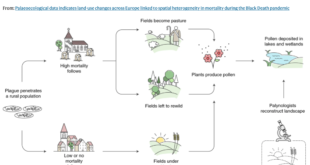from Lars Syll What does concern me about my discipline, however, is that its current core — by which I mainly mean the so-called dynamic stochastic general equilibrium approach — has become so mesmerized with its own internal logic that it has begun to confuse the precision it has achieved about its own world with the precision that it has about the real one … The dynamic stochastic general equilibrium strategy is so attractive, and even plain addictive, because it allows one to generate...
Read More »Newton’s lost revolution: Why his most radical work remains unread
from Asad Zaman The Puzzle of Newton’s Mind Isaac Newton is often celebrated as the ultimate rationalist, the scientist who unlocked the mysteries of the cosmos and ushered in the modern age. But there is a problem with this image—one that is so inconvenient that it has been quietly brushed aside. Newton, the father of modern physics, was also a theologian who wrote over a million words on religious matters. By sheer volume, he devoted more time to obscure theological debates than to the...
Read More »Debunking mathematical economics
from Lars Syll It is a great fault of symbolic pseudo-mathematical methods of formalising a system of economic analysis … that they expressly assume strict independence between the factors involved and lose all their cogency and authority if this hypothesis is disallowed; whereas, in ordinary discourse, where we are not blindly manipulating but know all the time what we are doing and what the words mean, we can keep “at the back of our heads” the necessary reserves and qualifications and...
Read More »Presentation for the Miami Book Fair – Mindless
23 November 2024 This book tells three stories about the impact of machines on the human condition: on the way we work, on our freedom, and on our physical survival. Each story contains within it a vision of heaven and hell: the promise of relief from work, freedom to think our own thoughts, and almost indefinite improvement of health and extension of life confronts their opposites in the spectre of human uselessness, of Orwelliam thought control, and of man made disaster....
Read More »Super Blue Moon Tonight?
If the skies are clear tonight by you, it may be interesting to look to the sky to see the Moon. Supposedly it is blue, full, and what is called a super moon. What is a super blue moon and why is it so rare? What is so special about the August 19 super blue moon. It is exactly a combination of three elements . . . a full moon, a supermoon, and a blue moon at the same time. According to NASA, tonight’s combination is quite ‘irregular’...
Read More »We’re killing it.
Right-wing ranters in my Twitter timeline are pooh-poohing the whole climate discussion without doing their homework. So, here’s a little reader to aid and abet (sorry, early retired teacher and that all).Let’s start at the beginning:1. CO2 is measured at the Manua Loa station. Results are clear, robust, and stark: CO2 is increasing. And no, CO2 is not ‘following temperature’ as the latest lazymeme from the lazyright wants to have it. It’s following us. We’re causing it. A ‘mass...
Read More »In-Box Topics Which May Be of Interest
Evey day, I get an array of emails in my In-Box offering up articles or what they think can be interesting reads. Some are hawking subscriptions too. I like to subscribe to news letters and magazines. The problem being, I never get a chance to finish them all. Law Why the Supreme Court rejected a case about LGBTQ+ conversion therapy bans, slate.com, Dahlia Lithwick and Joseph Stern. SCOTUS refused to take up Tingley v. Ferguson, a First...
Read More »Advances in plague research
Few doubt that the mid-fourteenth-century Afro-Eurasian plague pandemic, the Black Death, killed tens of millions of people. In western Asia and Europe, where its spread and mortality are best understood, upwards of 50% of the population is thought to have died within approximately 5 years. …The regionality of the plague’s mortality is particularly underexplored, owing to the availability of written sources and the limits of traditional historical methods. Here we pioneer a new approach, big...
Read More »Choose your own anti-science
On Tuesday I pointed to research that the Green Revolution might be the greatest antidote to poverty and poor health in human history. The revolution continues, with more and better crops and techniques available every year. Today, however, the main hurdles aren’t technology and logistics, but rather regulation and politics. One follower, for instance, sent me to this tweet: A modern variety of Golden Rice, GR2E, is safe, high-yielding and rich in beta carotene. That hasn’t stopped anti-GMO...
Read More »Why skyscrapers are too short
There’s a pattern that we frequently see in the development of a new technology. Initially, the practical functionality is limited by the technology itself – what’s built and used is close to the limit of what the technology is physically capable of doing. As the technology develops and its capabilities improve, there’s a divergence between what a technology can physically do and what it can economically do, and you begin to see commercialized versions that have lower performance but are...
Read More » Heterodox
Heterodox





